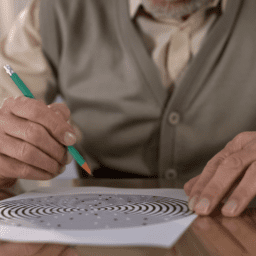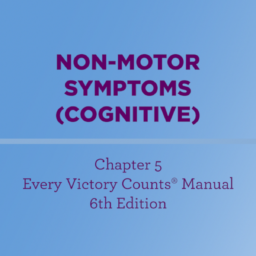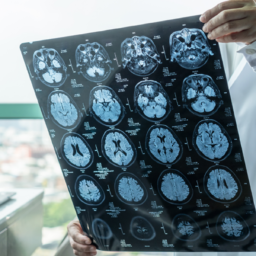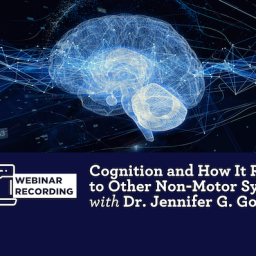Parkinson’s is much more than meets the eye. From emotional symptoms like depression to those that affect autonomic processes like digestion, non-motor symptoms are often just as impactful—and sometimes more so—than the visible symptoms of Parkinson’s. Non-motor symptoms that relate to cognition are no exception. Just as Parkinson’s can slow down movement (bradykinesia), it can also slow down your ability to think and process information (bradyphrenia). When this “cognitive slow down” is mild—more advanced than what is considered normal for a person’s age but not so severe that it interferes with activities of daily living—it is called mild cognitive impairment (MCI).
Statistics show that 20-50% of people with Parkinson’s experience MCI. This is because Parkinson’s alters many regions of the brain and dopamine systems, affecting executive function, language, and memory. Typically, a person with Parkinson’s and MCI can think and analyze, communicate, remember information, and function normally. However, in some cases, MCI can progress into dementia, a condition in which cognitive complications are so impaired that they interfere with daily functioning. The good news is that this progression of cognitive challenges can be slowed (and sometimes even reversed) when caught early and managed proactively.
For this reason, and because MCI can impact your overall quality of life, you and your care team must pay close attention to and address any changes you or they notice in your thinking, memory, language, and problem-solving abilities. In this post, we’ll help you learn to identify the signs of MCI, take action to boost your cognition, and prepare for possible cognitive changes you may experience as your Parkinson’s progresses.
What does MCI look like?
Parkinson’s impacts on cognition affect three main areas: executive function, language, and memory. Its effects on executive functioning can make it difficult to multitask, reason, solve problems, concentrate, and do complex planning. In the language area, MCI can interfere with your ability to find the right word during a conversation (sometimes called the “tip-of-the-tongue” phenomenon). You may also start to notice that your memory isn’t what it used to be or that you zone out in the middle of an activity.
Other signs of MCI that friends, partners, care partners, or you may notice include:
- Difficulty remembering names
- Misplacing items
- Difficulty understanding written and/or verbal communication
- Loss of focus and becoming easily distracted
- Difficulty making decisions
- Difficulty accomplishing complex tasks, including household tasks that you used to do on autopilot
- Repetition of the same questions or the same stories
MCI, and the frustration that often comes with it, is also associated with mood symptoms such as irritability, anxiety, apathy, and depression.
How can I tell if my MCI is progressing?
For many people living with Parkinson’s, cognitive changes will never progress beyond mild cognitive impairment. Others experience a slow, prolonged cognitive decline over time. Though less common, some people with Parkinson’s experience a dramatic cognitive decline over a short period of time. Parkinson’s experts still don’t have foolproof methods to determine how severe a person with Parkinson’s cognitive challenges may become, so it’s important to know what to look for in terms of possible progression and to speak up if you notice any changes in your thinking abilities and memory.
A decline in cognition can show up in various ways. For example, you may notice that you no longer feel comfortable driving, or you get lost traveling to spots in town that you’ve visited countless times. Your judgment may become increasingly impaired. You may struggle to complete routine tasks like counting out change at the store or making a pot of coffee, especially if the task involves multiple steps. You may have more difficulty speaking, understanding, following conversations, and expressing yourself. Your reading and writing abilities may worsen, and you may begin experiencing increased mood symptoms and less desire to engage in activities you once enjoyed.
If you experience significant impacts like these that greatly affect your quality of life and everyday activities, you may be experiencing dementia. Unlike MCI, dementia profoundly impacts daily living and limits your ability to care for yourself. Although experts do not fully understand how or why dementia often occurs with Parkinson’s, they do know that dementia and other cognitive complications are linked to changes in the brain that also cause mobility problems. Dementia, like Parkinson’s, occurs when nerve cells degenerate and chemical changes in the brain result.
How can I manage MCI?
Cognitive challenges, especially dementia, cause a lot of fear and can be difficult to discuss, even with your physician. However, you must share any concerns you or your loved ones have about your cognitive challenges with your care team. By being proactive in addressing these challenges, you can slow or even reverse some of Parkinson’s impacts on your cognition.
Here are some action steps to consider if you begin experiencing MCI or a noticeable decline in cognition:
- Talk with your physician. If you or your care partner and family members notice changes in your cognition, discuss them with your physician. Physicians can perform objective tests to measure your thinking and memory and determine when they should address cognitive impairment. And, because changes in cognition can have other causes (vitamin B12 deficiency, thyroid disease, urinary tract infection, pneumonia, stroke, side effects of medications), it is essential to tell your physician right away if you notice changes in your ability to pay attention, make decisions, form thoughts quickly, or remember details about events. These might be signs of an underlying medical problem that needs to be addressed.
- Get moving. Aerobic exercise has been proven, again and again, to improve cognition (as well as Parkinson’s motor symptoms and several non-motor symptoms). In fact, research suggests that of all the lifestyle changes that have been studied, regular physical exercise is one of the best things you can do to reduce your risk of getting dementia. Talk to your care team about ideal exercise routines, find several you enjoy, and regularly move your body.
- Consider visiting a neuropsychologist. A neuropsychologist is a healthcare professional specializing in understanding the brain’s relationship and behavior. They can give you a cognitive evaluation and offer recommendations for maintaining or improving your thinking skills and emotional functioning.
- Slow down. Give yourself more time for everyday activities and tasks. Try not to put so much pressure on yourself to rush to complete tasks and be patient with yourself when something takes longer to complete than it once did.
- Stay cognitively engaged. Brain exercises can help improve your cognitive functioning. Many games and puzzles are designed to boost the brain’s fitness, from traditional crossword puzzles to interactive brain teasers modeled after video games.
- Get (or stay) creative. Creativity can enhance cognition (while also boosting your mental and physical health!). If you’re new to the creative arts, ask your healthcare provider to refer you to an art, music, or dance therapist who offers creative, focused cognitive wellness programs. (And be sure to join us for our joy breaks, where we celebrate creativity and connection once a month!)
- Embrace new activities. Trying new things creates new pathways in the brain and helps keep your brain healthier. Seek out new and novel adventures and activities to continually challenge your brain. Find new exercise methods, different brain teasers, or a new route for your daily walk.
The key to living well with Parkinson’s and MCI is to be aware of your cognitive symptoms, speak up about any changes you experience, and take action each day to exercise and strengthen your brain.
Learn More
Learn more about cognition in our Every Victory Counts® manual. It’s packed with up-to-date information about everything Parkinson’s.
Thank you to our 2022 Peak Partners Amneal, Kyowa Kirin, and Sunovion, and our Every Victory Counts Gold Sponsor AbbVie Grants, Silver Sponsor Lundbeck, and Bronze Sponsors Supernus and Theravance for helping us provide the Every Victory Counts manual to our community for free.

















